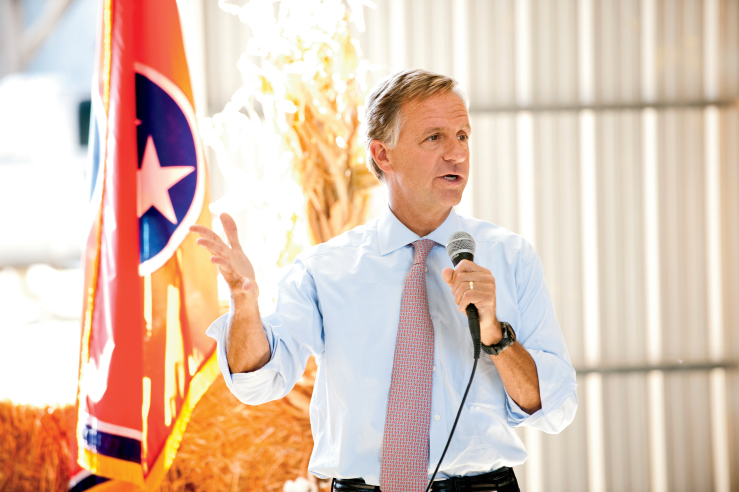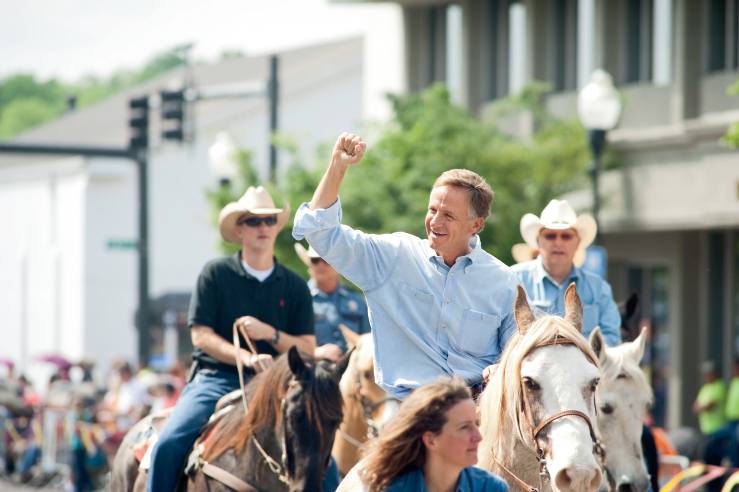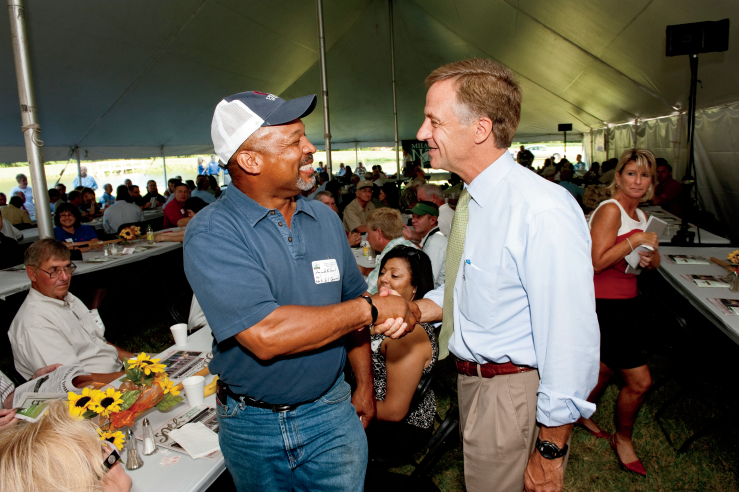Home > Tennessee > Tennessee Farm to Table > Candid Conversation with Gov. Bill Haslam
Candid Conversation with Gov. Bill Haslam
In partnership with: Tennessee Department of Agriculture

Can you talk a little bit about your family and business background and what influenced you to get into public service?
My father started our family’s business with one service station in Gate City, Va., in 1958. I grew up on course to be a history teacher and was considering the ministry. After I graduated from Emory University in Atlanta, I went to work for Pilot. I eventually became president of the company in 1995.
If there was one person who most encouraged me to get into public service it was current U.S. Senator Bob Corker. I had been at Pilot for about 20 years when some people encouraged me to run for mayor of Knoxville. Bob told me I could make 10 times as much difference for my community being mayor as what I was currently doing.
After I was elected to a second term as mayor of Knoxville, I began to think about running for governor. One of the things you have to consider in making that kind of decision is the impact on your family. I will always be grateful for the support they have given me, especially Crissy, who spent two years traveling the state with me as I campaigned for governor. It is an honor and a privilege to serve the state in this way, and I love the job.
What is your philosophy of the role of government, and how have your business and personal experiences influenced that philosophy?
In state government, it is our job to provide services that people can’t get on their own, and to do so in the most efficient and effective way with a focus on our customers, Tennessee’s taxpayers. One of the first things we did in office was to conduct a top-to-bottom review of every state department to focus their attention and resources on carrying out their core missions.
I don’t believe government creates jobs. I believe that we have to foster an environment that encourages investment. Jobs are created when people are willing to risk capital, and we want Tennessee to be as low of a risk as possible. We’ve worked to eliminate burdensome regulations, and our departments are working to serve businesses better. We’ve also focused on providing predictability to businesses by reforming our tort laws, and this year we’re proposing to update our worker’s compensation laws to create a fairer system for both employees and employers. Having management experience – both in the private and public sectors – makes a big difference.

What’s your perspective on agriculture and its importance to the state’s economy and quality of life?
Tennessee agriculture is very diverse, which is a strengthand helps stabilize our agricultural economy. It’s a $3.5 billion industry at the farm gate, and $71 billion in total economic impact when you add in all the services that go into delivering a product to the consumer. Tennessee is a state of mostly small family-owned farms. I like to think of them as independently owned and operated small businesses. This makes us one of the top states as far as the number of farms.
We’re blessed with abundant natural resources including productive soils, water and a moderate climate, which makes it an ideal location for everything from livestock and row crops to fruits and vegetables and agritourism. Half of our state is forested with mostly privately owned timberland, and we’re one of the top hardwood lumber producing states in the nation.
Agriculture and forestry also contribute to our quality of life – the beauty of our landscape, tourism and recreation – as well as a source of quality, locally grown and processed products.
You have made job creation and education a priority. How do Tennessee’s rural communities fit into these priorities?
About 90 percent of Tennessee farm families have some form of off-farm income. One spouse or another make take a job in order to have access to retirement or health benefits, or simply to make ends meet. Jobs are important for keeping families on the farm and land in production. So, jobs are just as important to our rural communities as they are to our urban and suburban areas.
Rural citizens are just as concerned about a quality education for their children as their urban counterparts, so all of the things we are doing – focusing on job creation, raising the standard of education, keeping the tax burden low, etc., – are important for improving the lives of all our citizens.
What can state government do to ensure the growth and viability of our rural areas?
The Department of Agriculture has placed a priority on rural economic development with the creation of the Ag and Forestry Economic Development Task Force. The task force was created to help improve information sharing within the department and among other partner agencies like ECECD, Labor and Tourist Development. I believe we can attract new investments and support expansion in our agricultural and forestry sectors. This not only provides jobs in rural areas where high paying jobs are scarce, but it often provides a market for our farm and forest products. The poultry industry is a great example where we have had significant growth and investment in world class processing and breeding facilities that provide high-tech jobs and also support more opportunities for farmers. We want to do more to cultivate this type of investment.
To take this a step further, I recently asked the Farm Bureau, Department of Agriculture and UT Institute of Agriculture to lead in the development of a strategic plan for growing our ag and forest industries. I think it’s important that we get input and buy-in from industry, and for us all to work together on some common goals. I’ve asked for some practical, affordable and actionable ideas on what we can do to ensure that Tennessee ag and forest industries are productive and competitive in the future, and I look forward to seeing what we can develop.

Our state is a major producer of beef cattle, cotton, tobacco, horses and hardwood lumber. What do you think the future holds for Tennessee agriculture and our ability to compete for world markets?
I think the future for Tennessee agriculture and forestry is very bright with our abundant natural resources and a moderate climate – access to river, rail and highway transportation. We’re centrally located to the nation’s major population centers, and we have among the best and brightest farmers and agricultural institutions.
I believe that Tennessee can and will play an important role in meeting changing consumer demands for locally grown and processed products as well as helping to feed an increasingly hungry, populated world. My goal is to help position Tennessee so that our agriculture and forestry industries can be productive, sustainable and take full advantage of these opportunities.
About Gov. Haslam
Born and raised in Knoxville, Bill Haslam was an executive for the family’s travel center business, now known as Pilot Flying J. He was elected Knoxville’s mayor in 2003 and re-elected four years later with 87 percent of the vote. In 2010, Haslam was elected governor of Tennessee with the largest margin of victory by a non-incumbent gubernatorial candidate in the state’s history.
Haslam and his wife, Crissy, have three children, a daughter-in-law, a son-in-law and a grandson. Haslam is an elder for the Cedar Springs Presbyterian Church in Knoxville.



